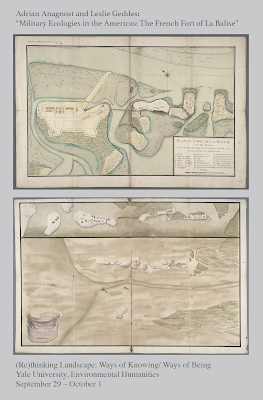Abstract: The French fort of La Balise, built in the early eighteenth-century, was at the nexus of marshland and sea in the Mississippi River Delta. Originally, the fortified settlement aimed to protect French colonial interests and secure access to the Mississippi River at a crucial juncture. Today, due to land loss along the Gulf of Mexico, the fort lies underwater at most tides, but visual evidence remains: a series of ink and watercolor maps produced for administrative oversight and sent to the Dépôt des Fortifications des Colonies.
Recognizing both advantages and hazards of the landscape, these maps document the enmeshment of fort and the Mississippi Delta’s complex ecosystem. Passage from the Gulf of Mexico to the river was fraught with peril, evident in references to shipwrecks alongside pictorial and textual demarcations of currents and oceanic depths. Simultaneously, French mercantile and social orders were imposed on the landscape, with a brickyard and designated settlement for enslaved Africans on an adjoining island. Exploitation of natural resources and racialized spatial segregation were formative to the colonial project in the Americas. We argue that depictions of the fort’s construction, amidst the ever-shifting environs of the Gulf South, reveal how topographic variability posed difficulties to pictorial rendering. Troubling rigid conceptualizations of landscapes and seascapes, maps reveal interpenetrating salt and freshwaters, shoals, and islands. As the French sought to make militarily secure this mutable terrain, the land itself challenged visual discernment, with colonial expansion, imperial power, and enslavement set against a natural landscape that thwarted cartographic fixity.
Monday, October 3, 2022
Adrian Anagnost and Leslie Geddes - “Military Ecologies in the Americas: The French Fort of La Balise”
On October 1st, Tulane art history professors Adrian Anagnost and Leslie Geddes presented their paper, “Military Ecologies in the Americas: The French Fort of La Balise,” as part of the Carceral and Military Ecologies panel at the (Re)thinking Landscape: Ways of Knowing/ Ways of Being conference at Yale University.
Subscribe to:
Post Comments (Atom)

No comments:
Post a Comment
Note: Only a member of this blog may post a comment.